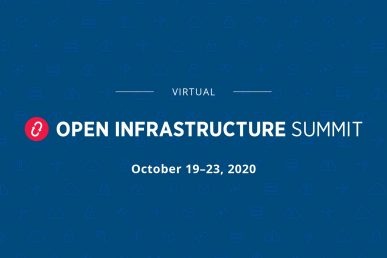The world of Open Infrastructure is broad. At the Open Infrastructure Summits, presentations cover 30+ open source projects, diverse use cases like 5G, container orchestration, private cloud architectures, and CI/CD across a large set of industries. This is my first Open Infrastructure Summit, so I know how daunting it can be to look at the set of topics and wonder where to begin.
If you haven’t heard, the upcoming Summit hosted by the OpenStack Foundation (OSF) will be virtual. The great news is that this now opens up the opportunity to speak (and attend!) for folks who have never been able to travel to an in person Summit—like me!
To help folks who are submitting sessions for the first time—or those returning who need a fresh idea—we have asked the Summit Programming Committee to share specific topics within their Tracks on what kind of presentations they want to be submitted.
The deadline to submit a session is Tuesday, August 4 at 11:59pm PT—see what this means in your time zone.
5G, NFV & Edge Computing
- Bare metal provisioning and pre-deployment validation are a couple of edge topics that need attention.
- Real-world use cases and stories about how 5G and Edge Computing are being deployed and changing how people are approaching communications, industrial or health care.
- Where the edge can be taken, provide clarity on definitions, and where the future is.
- 5G, NFV, Edge – Impact of 5G Rel16, ETSI NFV4, cloud-native micro data centers efforts on:
- Managed Container Infrastructure Object (MCIO) Pods
- Interfaces IFA040 and APIs Changes for MANO Orchestrator & VIM framework including OpenStack CNTT Rx1s and Kubernetes Rx2s.
- Changes to VNF, VNFC, CP a Tosca/Helm templates/Charts for VNFD, VDU, CPD schemas, & CRDs. Updating Config, FCAPS on Deployments, Deamonsets, Clusters, Namespaces starting Bare Metal hosts, nodes, Devices like GPU, FPGA, NVME, and other heterogeneous components.
- Open Infrastructure role in 5G core to Edge and Edge to Nomadic to Mobile Gateways and Consumer & Enterprise for 5G, IoT, and Edge use cases.
- Performance optimization for latency-sensitive, bandwidth sensitive and compute-intensive network functions including service function chaining, slicing, mapping, placements.
- Edge platform automation and scheduling for parallel life cycle management along with local loop monitoring and controls.
- Data-driven architectures, design, and enabled through hybrid VNF and Container workloads.
- Effect of merchant Silicon for NPU, GPU, DSPs in programmable solutions on in-line accelerations, and user/kernel offloads for latency optimizations.
- Language (py3.8, golang 1.4, DPC++, Java18, SYCL) Compilers and Dynamic Builds and Multi-CI and Mid-Stream integrations+Operations for both Upstream codes and Downstream deployments for Edge, NFV and 5G stacks.
- Impact of pandemic & glocalization of the supply chain on Open technology for different Edge, NFV & 5G, Markets.”
- Edge computing Stories
- Typical use cases for different industries
- telco
- manufacturing
- financial banking
- others
- How users use software/solutions about edge computing?
- StarlingX
- KubeEdge
- K3s
- Arkraino
- others
- What are the biggest challenges for building an edge cloud?
- security
- networking
- small footprint
- The relationship between 5G and edge computing
- How to build a mobile edge computing (MEC) platform for telco to support 5G
- Edge application innovations
- How to optimize the edge cloud to meet the requirement, such as low latency and high bandwidth?
- AI in edge computing environments
- Edge computing solution based on OpenStack, NFV issues when big scalable deployment, container-based VNF application running on OpenStack system.
Programming Committee:
- David Paterson, Sr. Principal Software Engineer, Dell Technologies
- Ian Jolliffe, VP R&D, Wind River
- Prakash Ramchandran, Technical Staff, Dell
- Shuquan Huang, Technical Director, 99Cloud
Xiaoguang Zhang, Project Manager, China Mobile
Artificial Intelligence (AI), Machine Learning & High Performance Computing (HPC)
- Submissions that addresses (but not limited to the following) scenarios on an OpenStack cloud:
- Implementing a test bench or frameworks for running HPC workloads for scientific research.
- Benchmark various machine learning algorithms, which show performance metrics on various use cases.
- How to prevent/eliminate biases in AI/machine learning predictions.
- Applying AI/machine learning algorithms in the healthcare domain such as predicting cancer for early treatment.
- Using the machine learning technique to prevent financial frauds
- Using machine learning algorithms such as NLP and supervised learning to improve the software development process and quality.
- Implementing AI/machine learning technique to maintain social distances or related preventive mechanisms in fighting COVID-19.
- The challenges of expanding and scaling a cloud while maintaining availability.
- Maximizing the performance of workloads on the cloud
- The use of GPUs and FPGAs in the cloud.
- Innovative uses of machine learning both in and on the infrastructure, as well as basic topics that introduce users to AI and machine learning’s particular infrastructure quirks.
Programming Committee:
- Armstrong Foundjem, Researcher, École Polytechnique montréal
- Alexander Dibbo, Cloud Architect, Science, and Technology Facilities Council (UKRI)
- Hector Augusto Garcia-Baleon
- Nick Chase, Head of Technical Content, Mirantis
CI/CD
- CI/CD innovation to support scenarios, including telco, edge, public and private cloud.
- Major technical development to address challenges in modern CI/CD
- CI/CD for cross-vendor/cross-community/cross-toolchain scenarios
- How reducing test duration can help to improve developer velocity on OpenStack itself.
- What consumers of OpenStack are doing with OpenStack for their CI.
- Sharing the knowledge from their CI/CD downstream or adjacent upstream among different communities.
- How we can speed up the execution time and more important things are stability so that we keep the development process more smooth, less-breaking, and quality verification.
Programming Committee:
- Chris MacNaughton, Software Engineer, Canonical
- Ghanshyam Mann, Cloud Consultant, NEC
- Qiao Fu, Technical Manager, Chine Mobile
Container Infrastructure
- Next-generation container orchestration – a world post-Kubernetes…
- Securing containers
- Serverless
- Innovation technologies and practice in a container and cloud-native area, including container runtime, image building and delivering improvement, container networking, container practice in large organizations, public cloud services, or in the edge computing environment, etc.
- How the telecommunication industry is evolving into cloud-native.
- Gap analysis between current implementation and telco requirements on container infrastructure/cloud-native platform.
Programming Committee:
- Matt Jarvis, Director of Community, D2iQ
- Qihui Zhao, Project Manager, China Mobile
- Xu Wang, Senior Staff Engineer, Ant Financial Services Group
Getting Started
- How to get started in contributing to whether code or docs. Getting involved from the operations side. Diversity and inclusion talks about getting started and being a part of the community
- Talks that break down complex components of OpenStack
- Talks that introduce to users/developers on how to adapt and contribute.
- First-time speakers showing their own experiences adopting OpenStack, the challenges and their tips on addressing them
- Developers from the community presenting on how new users can contribute upstream
- Speakers from the OpenStack governance talking about how to involved and how to seek help (communication channels ….)
- A talk showing a user’s use-case of migrating from commercial platforms generically to OpenStack
- Help more people know OpenStack and 4 opens.
Programming Committee:
- Amy Marrich, Principle Technical Marketing Manager, Red Hat
- Mohamed Elsakhawy, Operational Lead / System Administrator III, Compute Canada / SHARCNET
- Zhiqiang Yu, Open Source Program Manager, China Mobile Research Institute
Hands-on Workshops
- Material that is engaging and in an environment that promotes questions and discussions.
- “Taste of tech” – hands-on sessions designed to allow the experience of new and emerging tech without the intricacies of installation and deployment.
- Advanced sessions – troubleshooting, scaling, CI/CD demonstrations, maybe even sessions on application modernization and migration, ie, the monolithic to container model.
Programming Committee:
- Keith Berger, Senior Software Engineer, SUSE
- Mark Korondi
- Russell Tweed, Infrastructure Architect, Red Hat
Open Development
Here is what previous Planning Committees looked for:
- Content showcasing the power of the “Four Opens“
- What is open development
- Why do we need open development
- How does open development work
- What is the relationship between open development and Conway’s law
- How community success relates to a successful development
- How to participate in open development in modern open-source software projects
Programming Committee:
- Meghan Heisler, AT&T
Private & Hybrid Cloud
Here is what previous Planning Committees looked for:
- Private cloud and hybrid cloud implementation success stories, from small to large-scale (20 to 1,000 nodes), especially for industries with stringent requirements such as financial services and government
- Different methods to deploy OpenStack;
- How to scale and what, if any, are the bottlenecks?
- Large deployment references
- Maintaining cloud deployments
- User stories, devs updates
- New approaches for services integration
- Cross-community collaboration
- Presentations from actual superusers (providing user experience, testing and upstream at the same time)
- OpenStack operational challenges
Programming Committee:
- Belmiro Moreira, Cloud Architect, CERN
- Narinder Gupta, Lead Partner Solutions, Canonical
- Kenneth Tan, Executive, Sardina Systems
- Danny Abukalam, Solutions Architect, SoftIron
Public Cloud
- Content for operators of public clouds as well as end user-driven content.
- For operators, it’s super interesting to hear how others have solved things like billing, image life cycle management, monitoring, and auto-healing, etc, operator stuff that comes super important to keep track of your cloud(s).
- Talks on how to utilize OpenStack in a great way, what tools are out there, how can I use them, etc, could be tools like Terraform for example.
- Use case driven talks on how other end users are designing their infrastructure, how they automate that, how they leverage Kubernetes in OpenStack etc.
- Adaption of OpenStack clouds with other frameworks like Kubernetes, cloud resource selling to end customers, global cloud initiative.
- Adoption of containers with ease of use
- The future of OpenStack and public cloud co-existence
- Multi-cloud and ease of application portability
- Domain-specific computing
- Case studies on adoption and knowledge sharing
- Cloud in the emerging world and how others can help them catch up
Programming Committee:
- Frank Kloeker, Deutsche Telekom AG
- Krishna Kumar, Cloud Architect Sr., Accenture
- Tobias Rydberg, Senior Developer, City Network
Security
- Security content providing practical strategies to mitigate cloud security vulnerabilities and strengthen security posture for cloud users.
Programming Committee:
- Ashish Kurmi, Senior Cloud Security Engineer II, Uber Technologies
- Inside Open Infrastructure: June 2024 - June 18, 2024
- Inside Open Infrastructure: April 2024 - April 3, 2024
- Inside Open Infrastructure: January 2024 - January 18, 2024

)










